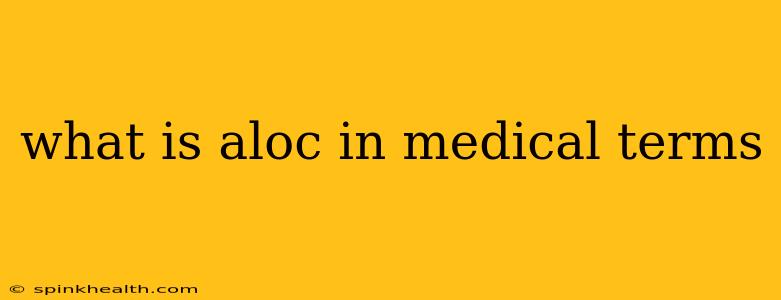What is ALOC in Medical Terms?
The medical abbreviation ALOC stands for altered level of consciousness. It's not a diagnosis itself, but rather a description of a patient's mental state indicating a deviation from their normal baseline awareness and responsiveness. Imagine a clear, calm stream—ALOC is like noticing that stream is now turbulent, possibly shallow in places, or even overflowing its banks. It signals something is amiss, requiring immediate attention.
Think of it like this: Your normal state is being fully awake, alert, and oriented to person, place, and time. If you're experiencing ALOC, some aspect of this baseline is disrupted. You might be drowsy, confused, disoriented, unresponsive, or somewhere in between. This wide spectrum is why ALOC is such a crucial sign for healthcare professionals.
What Causes Altered Level of Consciousness (ALOC)?
The causes of ALOC are incredibly diverse, ranging from relatively minor issues to life-threatening emergencies. Let's explore some common culprits:
1. Metabolic Issues: These are disruptions in the body's chemical balance. Think low blood sugar (hypoglycemia), low oxygen levels (hypoxemia), electrolyte imbalances (like low sodium), or even severe dehydration. These conditions can profoundly affect brain function, leading to ALOC. Imagine your brain as a high-performance engine—it needs the right fuel (glucose) and lubrication (electrolytes) to run smoothly. Without them, it sputters and stalls.
2. Infections: Serious infections like meningitis (brain infection) or sepsis (body-wide infection) can cause ALOC. The inflammatory response triggered by the infection can disrupt brain function, resulting in altered consciousness.
3. Neurological Issues: Conditions like strokes, brain tumors, traumatic brain injuries (TBIs), and seizures can all dramatically alter a person's level of consciousness. These events can directly damage brain tissue or disrupt its normal electrical activity.
4. Toxins: Exposure to toxins, whether from medications (overdoses), drugs, alcohol, or poisons, can cause ALOC. These substances disrupt the normal functioning of the brain's cells. Think of it like pouring the wrong fuel into your engine – it's not going to run correctly.
5. Cardiac Arrest: A sudden loss of blood flow to the brain due to cardiac arrest can also lead to ALOC. In this life-threatening event, the lack of oxygen severely impairs brain function.
How is ALOC Diagnosed?
Diagnosing the cause of ALOC is crucial. Doctors use a variety of tools, including:
-
Physical Examination: Checking vital signs (heart rate, blood pressure, breathing), neurological exam (assessing reflexes, strength, coordination), and observing the patient's behavior and responsiveness.
-
Blood Tests: Analyzing blood samples to check for infections, metabolic abnormalities, and toxins.
-
Imaging Tests: Such as CT scans or MRIs of the brain to look for structural abnormalities like bleeding, tumors, or swelling.
-
Electroencephalogram (EEG): This test measures the electrical activity of the brain to identify abnormal patterns associated with seizures or other neurological conditions.
What are the symptoms of ALOC?
The symptoms of ALOC can vary widely depending on the underlying cause and its severity, ranging from subtle changes to profound unresponsiveness. They might include:
- Lethargy or drowsiness: Feeling unusually tired or sleepy.
- Confusion: Difficulty with thinking clearly, remembering things, or following instructions.
- Disorientation: Not knowing where you are, who you are, or what time it is.
- Unresponsiveness: Not reacting to stimuli such as light, sound, or touch.
- Agitation: Restlessness, irritability, or anxiety.
- Slowed speech or slurred speech: Difficulty speaking fluently or clearly.
- Loss of coordination: Difficulty with balance or movement.
- Seizures: Involuntary muscle contractions.
Is ALOC a medical emergency?
Yes, ALOC is always considered a medical emergency because it suggests a serious underlying problem. The faster the cause is identified and treated, the better the chances of a positive outcome. Immediate medical attention is necessary.
In conclusion, ALOC is a serious sign indicating a disruption in brain function. Prompt medical evaluation is essential to determine the underlying cause and initiate appropriate treatment. The severity and specific symptoms can vary widely depending on the cause, highlighting the need for immediate medical attention.

